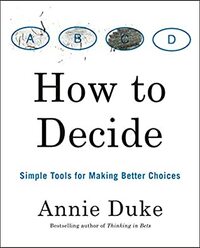You need to sign in or sign up before continuing.
Take a photo of a barcode or cover
A little long — but at the same time, this was a cogent explanation of a strategy that I know will be extremely helpful for reflecting on the past and planning the future.
I'm usually not one who reads "self help" books, and I'm not entirely sure that this qualifies as one, but this book has many good tools that far surpass common pros/cons lists.
Some of these include:
Knowledge trackers
Decision Multiverse Checklist
Probability, Preference, Payoffs framework
Archers' Mindset
Common terms of likelihood
Outside/inside view
Back casting and Premortem checklists
I'd certainly recommend it to others who feel like they could do better at thinking critically about making decisions
Some of these include:
Knowledge trackers
Decision Multiverse Checklist
Probability, Preference, Payoffs framework
Archers' Mindset
Common terms of likelihood
Outside/inside view
Back casting and Premortem checklists
I'd certainly recommend it to others who feel like they could do better at thinking critically about making decisions
informative
fast-paced
informative
slow-paced
Annie Duke Ilysm u nerd, all your books say the same thing (I’ll continue to read them)
We typically look at the outcome of the decision to make sense on whether it was a good decision. This is outcome bias. Hindsight bias distorts our memory of what we knew at that time. Choose a consideration and walk through potential outcomes. Go through the pros and cons of each consideration. Then weight the actual probability of those pros and cons. Compare the probabilities with outcome you like and dislike. Precise probabilities will help you make better decisions in order to avoid uncertainty. Accurate views capture both inside and outside perspectives. Identify low impact decisions and try to remove them quickly so that you can have more time for high impact decisions. Diligently finding negative outcomes can help you plan ahead to avoid them in the future. Think of pre-mortem analysis. If you want advise, don't share your view first or the outcome.
informative
medium-paced
challenging
informative
medium-paced
informative
informative
medium-paced

